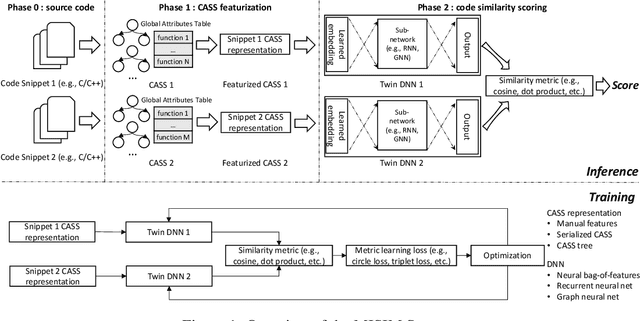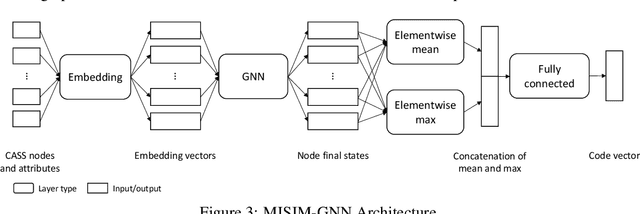Timothy Mattson
MPIrigen: MPI Code Generation through Domain-Specific Language Models
Feb 14, 2024



Abstract:The imperative need to scale computation across numerous nodes highlights the significance of efficient parallel computing, particularly in the realm of Message Passing Interface (MPI) integration. The challenging parallel programming task of generating MPI-based parallel programs has remained unexplored. This study first investigates the performance of state-of-the-art language models in generating MPI-based parallel programs. Findings reveal that widely used models such as GPT-3.5 and PolyCoder (specialized multi-lingual code models) exhibit notable performance degradation, when generating MPI-based programs compared to general-purpose programs. In contrast, domain-specific models such as MonoCoder, which are pretrained on MPI-related programming languages of C and C++, outperform larger models. Subsequently, we introduce a dedicated downstream task of MPI-based program generation by fine-tuning MonoCoder on HPCorpusMPI. We call the resulting model as MPIrigen. We propose an innovative preprocessing for completion only after observing the whole code, thus enabling better completion with a wider context. Comparative analysis against GPT-3.5 zero-shot performance, using a novel HPC-oriented evaluation method, demonstrates that MPIrigen excels in generating accurate MPI functions up to 0.8 accuracy in location and function predictions, and with more than 0.9 accuracy for argument predictions. The success of this tailored solution underscores the importance of domain-specific fine-tuning in optimizing language models for parallel computing code generation, paving the way for a new generation of automatic parallelization tools. The sources of this work are available at our GitHub MPIrigen repository: https://github.com/Scientific-Computing-Lab-NRCN/MPI-rigen
Domain-Specific Code Language Models: Unraveling the Potential for HPC Codes and Tasks
Dec 20, 2023Abstract:With easier access to powerful compute resources, there is a growing trend in AI for software development to develop larger language models (LLMs) to address a variety of programming tasks. Even LLMs applied to tasks from the high-performance computing (HPC) domain are huge in size and demand expensive compute resources for training. This is partly because these LLMs for HPC tasks are obtained by finetuning existing LLMs that support several natural and/or programming languages. We found this design choice confusing - why do we need large LMs trained on natural languages and programming languages unrelated to HPC for HPC-specific tasks? In this line of work, we aim to question choices made by existing LLMs by developing smaller LMs for specific domains - we call them domain-specific LMs. Specifically, we start off with HPC as a domain and build an HPC-specific LM, named MonoCoder, that is orders of magnitude smaller than existing LMs but delivers similar, if not better performance, on non-HPC and HPC tasks. Specifically, we pre-trained MonoCoder on an HPC-specific dataset (named HPCorpus) of C and C++ programs mined from GitHub. We evaluated the performance of MonoCoder against conventional multi-lingual LLMs. Results demonstrate that MonoCoder, although much smaller than existing LMs, achieves similar results on normalized-perplexity tests and much better ones in CodeBLEU competence for high-performance and parallel code generations. Furthermore, fine-tuning the base model for the specific task of parallel code generation (OpenMP parallel for pragmas) demonstrates outstanding results compared to GPT, especially when local misleading semantics are removed by our novel pre-processor Tokompiler, showcasing the ability of domain-specific models to assist in HPC-relevant tasks.
Scope is all you need: Transforming LLMs for HPC Code
Aug 18, 2023



Abstract:With easier access to powerful compute resources, there is a growing trend in the field of AI for software development to develop larger and larger language models (LLMs) to address a variety of programming tasks. Even LLMs applied to tasks from the high-performance computing (HPC) domain are huge in size (e.g., billions of parameters) and demand expensive compute resources for training. We found this design choice confusing - why do we need large LLMs trained on natural languages and programming languages unrelated to HPC for HPC-specific tasks? In this line of work, we aim to question design choices made by existing LLMs by developing smaller LLMs for specific domains - we call them domain-specific LLMs. Specifically, we start off with HPC as a domain and propose a novel tokenizer named Tokompiler, designed specifically for preprocessing code in HPC and compilation-centric tasks. Tokompiler leverages knowledge of language primitives to generate language-oriented tokens, providing a context-aware understanding of code structure while avoiding human semantics attributed to code structures completely. We applied Tokompiler to pre-train two state-of-the-art models, SPT-Code and Polycoder, for a Fortran code corpus mined from GitHub. We evaluate the performance of these models against the conventional LLMs. Results demonstrate that Tokompiler significantly enhances code completion accuracy and semantic understanding compared to traditional tokenizers in normalized-perplexity tests, down to ~1 perplexity score. This research opens avenues for further advancements in domain-specific LLMs, catering to the unique demands of HPC and compilation tasks.
Advising OpenMP Parallelization via a Graph-Based Approach with Transformers
May 16, 2023



Abstract:There is an ever-present need for shared memory parallelization schemes to exploit the full potential of multi-core architectures. The most common parallelization API addressing this need today is OpenMP. Nevertheless, writing parallel code manually is complex and effort-intensive. Thus, many deterministic source-to-source (S2S) compilers have emerged, intending to automate the process of translating serial to parallel code. However, recent studies have shown that these compilers are impractical in many scenarios. In this work, we combine the latest advancements in the field of AI and natural language processing (NLP) with the vast amount of open-source code to address the problem of automatic parallelization. Specifically, we propose a novel approach, called OMPify, to detect and predict the OpenMP pragmas and shared-memory attributes in parallel code, given its serial version. OMPify is based on a Transformer-based model that leverages a graph-based representation of source code that exploits the inherent structure of code. We evaluated our tool by predicting the parallelization pragmas and attributes of a large corpus of (over 54,000) snippets of serial code written in C and C++ languages (Open-OMP-Plus). Our results demonstrate that OMPify outperforms existing approaches, the general-purposed and popular ChatGPT and targeted PragFormer models, in terms of F1 score and accuracy. Specifically, OMPify achieves up to 90% accuracy on commonly-used OpenMP benchmark tests such as NAS, SPEC, and PolyBench. Additionally, we performed an ablation study to assess the impact of different model components and present interesting insights derived from the study. Lastly, we also explored the potential of using data augmentation and curriculum learning techniques to improve the model's robustness and generalization capabilities.
MPI-rical: Data-Driven MPI Distributed Parallelism Assistance with Transformers
May 16, 2023Abstract:Automatic source-to-source parallelization of serial code for shared and distributed memory systems is a challenging task in high-performance computing. While many attempts were made to translate serial code into parallel code for a shared memory environment (usually using OpenMP), none has managed to do so for a distributed memory environment. In this paper, we propose a novel approach, called MPI-rical, for automated MPI code generation using a transformer-based model trained on approximately 25,000 serial code snippets and their corresponding parallelized MPI code out of more than 50,000 code snippets in our corpus (MPICodeCorpus). To evaluate the performance of the model, we first break down the serial code to MPI-based parallel code translation problem into two sub-problems and develop two research objectives: code completion defined as given a location in the source code, predict the MPI function for that location, and code translation defined as predicting an MPI function as well as its location in the source code. We evaluate MPI-rical on MPICodeCorpus dataset and on real-world scientific code benchmarks and compare its performance between the code completion and translation tasks. Our experimental results show that while MPI-rical performs better on the code completion task than the code translation task, the latter is better suited for real-world programming assistance, in which the tool suggests the need for an MPI function regardless of prior knowledge. Overall, our approach represents a significant step forward in automating the parallelization of serial code for distributed memory systems, which can save valuable time and resources for software developers and researchers. The source code used in this work, as well as other relevant sources, are available at: https://github.com/Scientific-Computing-Lab-NRCN/MPI-rical
MISIM: An End-to-End Neural Code Similarity System
Jun 15, 2020



Abstract:Code similarity systems are integral to a range of applications from code recommendation to automated construction of software tests and defect mitigation. In this paper, we present Machine Inferred Code Similarity (MISIM), a novel end-to-end code similarity system that consists of two core components. First, MISIM uses a novel context-aware similarity structure, which is designed to aid in lifting semantic meaning from code syntax. Second, MISIM provides a neural-based code similarity scoring system, which can be implemented with various neural network algorithms and topologies with learned parameters. We compare MISIM to three other state-of-the-art code similarity systems: (i) code2vec, (ii) Neural Code Comprehension, and (iii) Aroma. In our experimental evaluation across 45,780 programs, MISIM consistently outperformed all three systems, often by a large factor (upwards of 40.6x).
 Add to Chrome
Add to Chrome Add to Firefox
Add to Firefox Add to Edge
Add to Edge